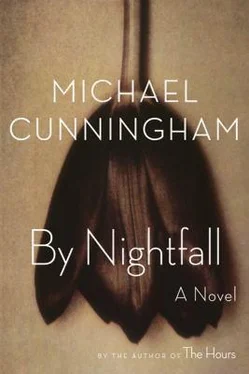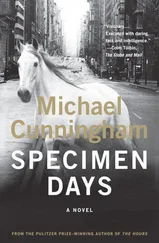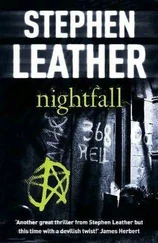“Will you do me a favor?” he asks.
“Of course.”
“Will you tell me I wasn’t the worst father in the world?”
“No. You were nothing like the worst father in the world. You did the best you could.”
She kisses him chastely on the cheek. And that’s that.
They perform their morning ablutions like the dance team they’ve become. He shaves while she showers, and when she’s done showering she leaves the water on for him because it takes him exactly as long to shave as it does her to shower. Impossible not to see it sometimes as a film montage, Scenes from a Marriage (oh, our corrupted imaginations), the synchronized washings and brushings and putting-on of clothes. Peter is the faster and more decisive dresser, which is funny, because he’s more vain and nervous than she is, but for workdays he’s got that man thing in his favor, just pick one of the four suits and one of the ten shirts, all of which go with any of the four suits. Rebecca puts on the dark pencil skirt (Prada, almost immorally expensive, but she was right, she’s worn it for years) and the thin mocha-colored cashmere sweater, asks him if it looks okay, he tells her yes but she changes anyway. He understands—although it’s just a conference call she’s looking for the lucky outfit, the one that’ll make her feel as forcefully herself as it’s possible for her to feel. He leaves her going through the closet, does a quick check of the kitchen for something breakfastlike, decides he’ll just grab a Starbucks sandwich en route, goes back into the bedroom, where Rebecca has switched to the navy blue sheath dress which, as he can tell immediately by her face, isn’t going to feel right either.
“Good luck today,” he says. “Call me after you’ve had the conference.”
“You know I will.”
A quick kiss and he’s off, past the closed door behind which Mizzy sleeps, or pretends to sleep.
The next couple of hours at the gallery are taken up with what Peter and Rebecca have come to call the Ten Thousand Things (as in, over the phone, “What are you doing?” “Oh, you know, the Ten Thousand Things”), their shorthand for the ongoing avalanche of e-mails and phone calls and meetings, their way of conveying to each other that they’re busy but you don’t want to know the particulars, they don’t even interest me. All Uta offers regarding Groff is what Peter calls her German look, a Teutonic hauteur that implies precisely what it’s meant to imply: Little guy, it’s a big world, why don’t you consider agonizing over things that actually matter? He’d like to have the conversation with Uta that he’d like to have had with Rebecca, the one about compromise and his refusal to dismiss the question as trivial; he’d like, in fact, to have talked to Uta about the idea of closing the gallery and doing… something else. No idea what, of course. And why would Uta, who likes her job just fine, who’s happy enough with good-enough art—why does he think she’d want to have that particular conversation with him?
Still. It’d be nice to have that conversation with someone, and although Bette is the likeliest candidate he can’t really have it with Bette. He’s not at all convinced that her sense of discouragement with the world of art sales isn’t a defense—who wants to leave a party when it’s going strong? If Bette pretends to be disgusted with commerce, doesn’t it cede less power to her illness? Does he really want to be a healthy younger man complaining about staying at the very same party she’s being compelled to leave?
He takes the L out to Bushwick (the limo days are over, even if you could still afford them it wouldn’t look good, pulling up in front of an artist’s studio like the king of fucking England, not now, not when you’re asking your artists to understand that despite your best efforts the work just might not sell, because, as you may have heard, the international economy has collapsed). Peter still wears the suits because, well, he’s already got them, and he’s become known for a certain Tom Ford suavity. It’s a balancing act, really. You want to reassure the artists that you’re not frittering money away at their expense and you want at the same time to let them know that you’re doing okay, that you’re not asking them to stay aboard a sinking ship. So. You sit reading the Times on the L train, Bushwick-bound, in your black suit and your charcoal gray polo shirt.
And then, at the Myrtle Avenue stop, up the stairs among the sparse crowd of the trudging and the beleagured. Eleven forty a.m. on the Canarsie-bound L is not a time or destination for those who are prospering in the world and out into Bushwick proper, which could be the outskirts of Cracow (where, admittedly, he’s never been), or any one of a number of formerly Soviet Eastern European cities that were grimly industrial under the Soviets and remain not only grim and industrial but increasingly decrepit. Like an Eastern European city, Bushwick has sprouted, here and there, struggling signs of new life—a grocery store, a coffeehouse—intermingled with the dying embers of the old new life, a dim and faded bridal shop, a dry cleaner’s where they seem to believe a window that displays a pile of folded shirts under a yellowing spider plant will be good for business.
Peter heads up Myrtle, looking for Groff’s address. Bushwick is bleak, no denying it. Bushwick clearly never intended to be anything but bleak. It was always peripheral and utilitarian. The people who built these warehouses and garages and storage buildings surely didn’t imagine that anyone would ever actually live here. Here in the outer boroughs, this one anyway, we find ourselves in the presence of a different set of founding intentions. If Manhattan rose fundamentally out of the grander ambitions of the Industrial Age, all those muscled worker-gods bearing columns, all those ziggurat-topped buildings rising toward a heaven that had never seemed so near, Bushwick (God knows how old it is) is inherently modest and plain, meant (it seems) from the beginning to be outlying, meant for the making of small parts, the warehousing of goods, like the sturdy but limited old uncle in an illustrious family, a decent man without beauty or imagination who does some small job and never married, who is known but not exactly loved.
And yet, behind some of these casemented warehouse windows, artists are at work.
Peter wonders: Does the fringey urban semi-exile in which most artists live affect their output? Sure, young artists are expected to be poor, they’re supposed to be poor, but the poor artists of other generations lived in Paris or Berlin or London, they lived in Greenwich Village. To what extent do the Impressionists exist at all because it was suddenly so much cheaper to leave Paris and go to Provence? Yes, they lived meagerly, but they lived in places of real if sometimes decaying beauty; they lived in cities or villages that could be rough but had no doubts about their ancient profundity, their queenly rights not only to exist but to exult in their own habits and particulars. Bushwick, on the other hand, is pretty close to nowhere. Its founders didn’t take much trouble with it; even the oldest of the buildings were obviously put up as quickly and cheaply as possible. In a place like this, wouldn’t it seem a little… silly to think about producing earnest work that aspired, however imperfectly, to the profound? I mean, hello, Bushwick, hello, America, hello, mega-malls and feed lots. Here’s my attempt to slit the skin of mortality and see what glitters on the other side. How embarrassing would that be?
Who was it who said a country gets the government it deserves? Does America get the art it deserves?
And here, now, is Groff’s building, halfway down an industrial block on Wilson. Peter hits the buzzer.
Читать дальше
Конец ознакомительного отрывка
Купить книгу












